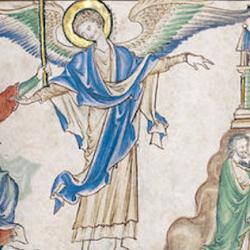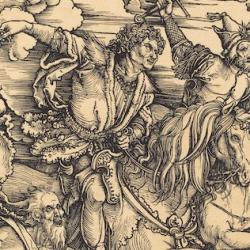The dragon mounts three attacks on the woman (Revelation 12).
First, he stands ready to attack the laboring woman and gobble up her child (vv. 1-4). The child is snatched away to heaven and the woman flees to the wilderness. Here the dragon is taking the role of Herod, who sought to wipe out the threat from Jesus at the outset.
Second, he is thrown from heaven and mounts a direct attack on the child-less woman (vv. 13-14). Again she escapes, this time on Exodus eagle wings, again to the wilderness. This appears to be an attack on the earth Jewish church in Jerusalem, which scattered after the death of Stephen and James.
Third, now in his guise as “serpent,” he tries to drown the woman with a flood, but the earth receives the water and the woman again escapes (vv. 15-16). This is seduction more than frontal attack, the serpent spewing deadly heresy from his mouth.
Frustrated, the dragon leaves off the woman and goes after her children (v. 17), but he’s not really learned his lesson. He tries it all over again, now through minions, two beasts and a model. So far, there’s not been much damage. The child escaped the dragon, and while the woman has had to hustle and hurry, she’s safe, and got a Tolkeinesque eagle-ride along the way.
The henchbeasts are more successful. Their tactics are slightly different.
First, the sea beast makes war against the saints, replicating the dragon’s initial attack on the woman and child. The sea beast overcomes (13:8). The sea is Gentile, and so the sea monster is a Gentile power, Rome.
Then a beast emerges from the land, a Jewish beast, devoted to serving the one king that the Jews acknowledged, Caesar. He works by deception rather than frontal attack (13:14). The land beast is serpentine rather than draconic; his efforts replicate the flood from the mouth of the dragon.
Finally, there’s an image of the beast, and the land beast encourages veneration of the sea beast’s image (13:15). Like the land beast, the image talks and talks, but he also has power to prevent those who refuse to worship to be killed, perhaps in a fiery furnace (13:15).
The beasts accomplish with the woman’s “other offspring” what the dragon could not accomplish with the woman: They overcome. In the long run, of course, they are as ineffectual as the dragon, since they are overcome in their very overcoming, as the Lord turns their attacks on the saints into the basis of their own destruction.










